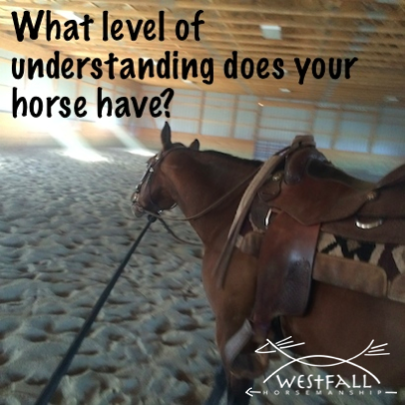 When training horses I am always observing their level of maturity. Sometimes this is measured by the number of correct responses that they have to training situations but other times it is measured by their general demeanor. Horses, like people, mentally mature at different rates. It is tempting to measure a horses maturity by ‘testing’ their knowledge of physical cues and knowledge of physical cues is one level of maturity.
When training horses I am always observing their level of maturity. Sometimes this is measured by the number of correct responses that they have to training situations but other times it is measured by their general demeanor. Horses, like people, mentally mature at different rates. It is tempting to measure a horses maturity by ‘testing’ their knowledge of physical cues and knowledge of physical cues is one level of maturity.
Take for example the horse in this photo. She is making one of my favorite mistakes. I say ‘mistake’ because in reality she is taking the cue very literally and she is not reading the rest of the situation. I am standing on her left side but I have the line attached to the right side of the bit. I have been asking her to do inside turns on the lunge line but I have left the line attached to only the right side of the bit. I am testing her maturity level.
At this point I have asked for inside turns, left, right, left, right, around twenty times. About eighty percent of the time she gets the answer correct and does inside turns because most of the cues are coming from my body position. When she is focused on my body she is able to determine that, although the rein is attached to the right side of the bit, the pressure can mean more than literally ‘turn right’. When she is distracted she makes the mistake of regressing to a lower level of training, as she is doing in this photo, and she tries to turn right.
Eventually with practice she will be able to ‘read between the lines’ and make consistently mature decisions. Decisions that are based on more that the literal translation of ‘pressure on the right side means turn right’ which is a good thing….because neck reining and many other advanced maneuvers require a higher level of maturity and an ability to ‘read between the lines.’
11 Comments
Leave a Comment

FREE PDF DOWNLOAD
WHY IS MY HORSE...?
100% Private - 0% Spam
No one taught you the skills you need to work through these things.
Riders often encounter self-doubt, fear, anxiety, frustration, and other challenging emotions at the barn. The emotions coursing through your body can add clarity, or can make your cues indistinguishable for your horse.
Learning these skills and begin communicating clearly with your horse.
Click here to learn more.

Thank you Stacy.
We are having 4 minis visit with a massage therapist for the hands on day. The other days there will be visits from a veterinarian and equine physical therapist without horses. We are also visiting a local Arabian horse farm and a 4H barn with a newborn for demonstrations. Great suggestions on using your videos. You are a blessing.
I do the same thing with my horses, except I never made the connection to maturity.
What outline would you use if you were teaching middle school students for 1 1/2 hours for 5 days?
I have the opportunity to teach equine education at Kalamazoo Christian Middle School next week.
This is classroom time, hands on, non-mounted teachings.
The children are from beginners to prize winners.
Just to be clear, you will or will not have an actual horse?
I would use some video too. I have played episodes of the Stacy’s Video Diary and muted the TV so that we could talk about the body language of the horse, of the handler, etc. Talking about the body language in a young/green horse vs an older broke horse (if you have one there) is also interesting.
The video of Newt and the box is interesting and then if you had a live horse and real box you could repeat and talk about it. Hum, I’m still thinking…
I really enjoy how you explain it’s important to: 1. open their minds or prep them to learn. 2. measure their level of understanding. 3. Reward while their obeying the signal. (Release the cue or reassure by voice). I witnessed Stacy perform all these traits and talents on horses she had just met last Sunday at MSU. It was impressive how quickly she was able to teach them and how well they responded to her cues. Impressive.
Happy Connecting. Sent from my Sprint Samsung Galaxy S® 5
Thank you! So glad you enjoyed the Michigan expo 🙂
Very interesting! Thanks!
I have been trying to get in touch with you about some tickets I have to RRTH. I cant go now. Please email me back so I can let you know about them. Also reservations for a room.
So sorry you cannot go. I already have my tickets and place to stay. Have you contacted RTTH?
Yes I have I was going to just give them to you so you could make sure at least the seats are filled. Tried to sell them on fb but no takers. RTTH will not let me offer them on their fb page.
I see. Well, if you want to mail them I can try handing them out. The address is PO Box 68, Mount Gilead, OH 43338. Too bad you can’t make it!